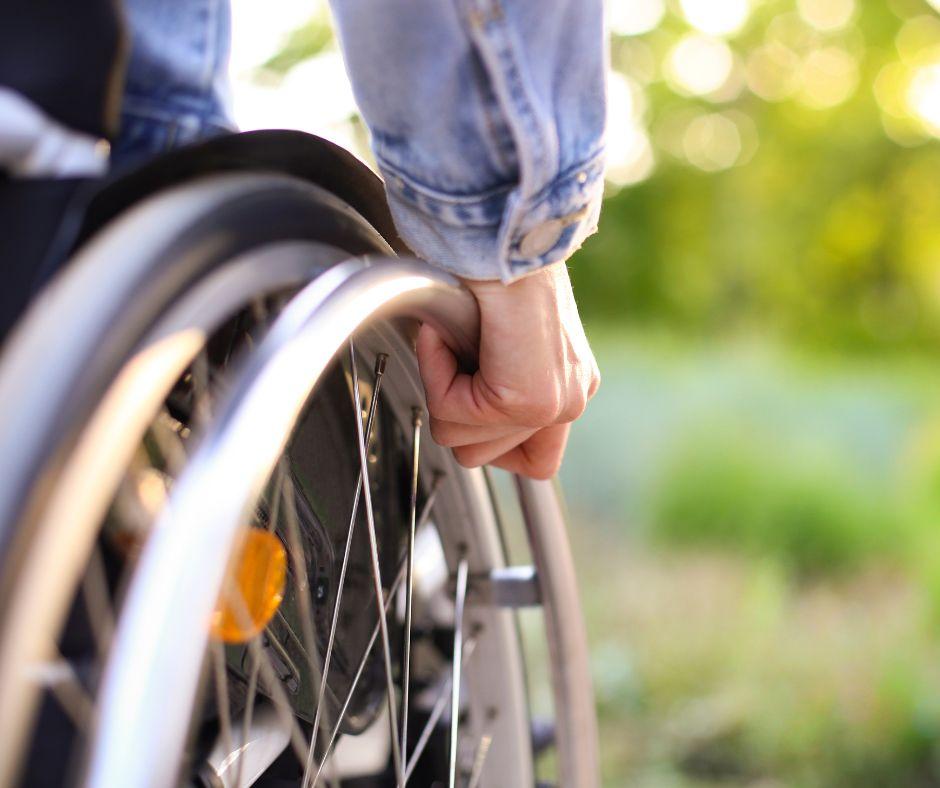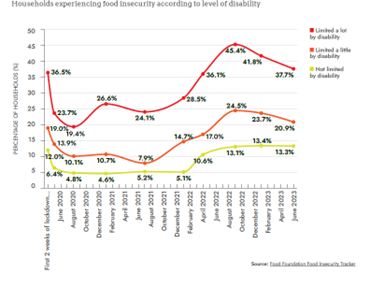19 December 2023
Households with a disabled person suffering higher levels of food insecurity

Households with a disabled person experience disproportionate levels of food insecurity, analysis from The Food Foundation has found
The Food Foundation has today published a briefing, funded by The Nuffield Foundation, that investigates food insecurity and inequalities experienced by disabled people.
It comes after Downing Street seemingly tried to axe the role of Minister of State for Disabled People entirely, but U-turned on the decision in the face of public backlash. Despite this, the post was still downgraded to become a Parliamentary Under-Secretary of State, a more junior rank in the Government.
This sends a worrying message to the UK’s 16 million disabled people as The Food Foundation’s briefing finds that:
- Nearly 4 in 10 households with an adult limited a lot by disability experienced food insecurity in June 2023
- Households with a disabled person are substantially more likely to experience food insecurity than those without
- These disproportionate rates of food insecurity are in large part a result of income inequalities experienced by disabled people. Disabled people are less likely to be employed and on average are paid lower salaries
- Many disabled people are reliant in part, or entirely, on benefits which often do not provide sufficient levels of payment to cover essential costs
- Disabled people also often have higher expenditure requirements in other essential areas which squeezes the available food budget
Other challenges include physical access to food such as from transport issues or challenges with food preparation leading to a reliance on more processed, convenience food.
The shocking findings demonstrate that disabled people in the UK still experience drastic inequalities, are at much higher risk of food insecurity and their ability to access food was much worse affected by the Covid and cost of living crises than people who are not disabled.
The Food Foundation has been conducting nationally representative surveys to monitor levels of food insecurity since the start of the Covid-19 pandemic.
The aim of this is to track the scale of the problem of food insecurity and identify groups of the population who are most at risk to know who most needs support targeted towards them.
In the first two weeks of the pandemic, the survey found people limited a lot by disability to be three times as likely to experience food insecurity as those without a disability (36.5% vs 12.0%).
This inequality widened further reaching over five times as high in January 2022 (28.5% compared with 5.1%).
The most recent survey found that food insecurity amongst disabled households persists. Nearly four in 10 (37.7%) households with an adult limited a lot by disability experienced food insecurity in June 2023 compared with just over one in 10 (13.3%) households with no disability.

The briefing explains that food insecurity among disabled people is driven by a range of factors. Disabled people are less likely to be employed and, on average, are on lower salaries.
Previous data from Scope found that one in four (27%) working aged disabled people are living in poverty. Government data shows the employment rate for people with a disability is 52.6% compared to 82.5% for people without a disability.
When disabled people are in employment, they often have lower incomes and less job security than people without. 27% of disabled workers are in severely insecure work compared with 19% of non-disabled workers.
The Resolution Foundation found that household income for adults with a disability was on average 30% lower than those without including disability payments.
Many disabled people are reliant on social security but the briefing shows the benefits system does not sufficiently support them.
Disabled people often have higher expenditure requirements in other essential areas which squeezes available budget for food.
Some estimates report that households with a disabled adult or child face costs of almost £1,000 extra per month. This can include higher energy bills due to increased need for heating, running medical equipment and additional washing.
The briefing shows that financial barriers are not the only challenges that disabled people can face in accessing food. Other challenges include physical access to food from transport issues or inaccessible food environments.

The Food Foundation is calling for greater policy action to support disabled people and their families. In particular, benefit levels (Universal Credit and PIP) need to take into account the cost of a healthy diet and other essentials including the additional costs that disabled people experience.
Access to nutritional safety nets should also be made easier, for example children who are unable to attend school due to disabilities should receive supermarket vouchers instead of a Free School Meal.
The briefing also sets out actions that should be taken by local authorities and retailers to create a fairer food system.
Shona Goudie, Policy and Advocacy Manager at The Food Foundation, said: "It is unacceptable that there are such high rates of food insecurity amongst disabled people and that they have had to suffer disproportionately during COVID and the cost of living crises.
"There is no excuse for not giving disabled people the support they need. Policy makers need to take action now to reduce these inequalities and protect disabled people from unfair hardships."
Fazilet Hadi, Head of policy at Disability Rights UK, said: "This report puts a spotlight on the disproportionate impact of food poverty on disabled people with the most severe impairments and health conditions.
"Systemic inequalities, spiralling costs, inadequate social security levels and barriers to getting around and or preparing food are all resulting in disabled people going without food.
"This is not something which society should tolerate. We need government, retailors and third sector organisations to take action to prevent this injustice."
The briefing looks at some of the common experiences of disabled people faced with food insecurity. The following quotes are part of a larger multi-methods project on food (in)security among disabled people by researchers at King’s College London, supported by Disability Rights UK:
Amanda, who is disabled, said: "I just mainly choose prepared food, easy to cook things, and I use my microwave a lot more than before because I have difficulty bending down to my oven… and obviously getting something out is difficult and then standing back up again.
"My weight has decreased a lot because I only really eat when I’m very hungry now and at really irregular times.”
Bella, who is disabled and lives with her partner who is also disabled, said: "I can’t really go to a supermarket. Even when I could, you know I could drag myself to the supermarket, but I needed somebody to push the trolley, carry the basket, pick the things off the shelves and then pack them up and carry them.
"We can’t make savings on fuel, both of our conditions, means that the cold affects us so we have to have the heating on when we need to.
"And we run the dialysis machine, which is like running a washing machine for four hours, four times a week. It uses a lot of water. And there’s nothing we can do about that."
John McDonnell MP, the Former Shadow Chancellor of the Exchequer, said: "The soaring rates of food insecurity amongst disabled people in modern Britain is a disgrace.
"Disabled people in our society were disproportionately affected by Covid-19 and they have continued to suffer even more than most through the cost of living crisis.
"All the political parties must now come together to create a consensus to the end the poverty and indignity that too many disabled people have to endure. There is no excuse for allowing the status quo to continue."
NOTES TO EDITORS
Please contact Juliet Grant on 07929075489 or email juliet.grant@foodfoundation.org.uk
AVAILABLE FOR INTERVIEW
Shona Goudie, Policy and Advocacy Manager
SOCIAL MEDIA
Twitter: @Food_Foundation
Instagram: food.foundation
ABOUT THE FOOD FOUNDATION
The Food Foundation is a charity working to influence food policy and business practice, shaping a sustainable food system which makes healthy diets affordable and accessible for all. We work in partnership with researchers, campaigners, community bodies, industry, investors, government and citizens to galvanise the UK’s diverse agents of change, using surprising and inventive ideas to drive fundamental shifts in our food system. These efforts are based on the continual re-evaluation of opportunities for action, building and synthesising strong evidence, convening powerful coalitions, harnessing citizens’ voices and delivering impactful communications.
ABOUT THE POLICY BRIEFING
This policy briefing draws on research commissioned by The Food Foundation, and funded by the Nuffield Foundation, which focusses in-depth on the experiences of people living in food insecurity in the UK. Through this research, The Food Foundation aims to re-shape the public narrative on food insecurity and to catalyse purposeful action from policy makers and businesses.
SURVEY
- The surveys were commissioned by The Food Foundation and conducted by YouGov. The most recent was among 6000 adults in the UK between 26th-30th June 2023.
- Among 6000 adults surveyed, 740 adults were limited a lot by disability and 1282 adults were limited a little by disability.
With thanks to our funder:
ABOUT THE NUFFIELD FOUNDATION
The Nuffield Foundation is an independent charitable trust with a mission to advance social well-being. It funds research that informs social policy, primarily in Education, Welfare, and Justice. The Nuffield Foundation is the founder and co-funder of the Nuffield Council on Bioethics, the Ada Lovelace Institute and the Nuffield Family Justice Observatory. The Foundation has funded this project, but the views expressed are those of the authors and not necessarily the Foundation.


